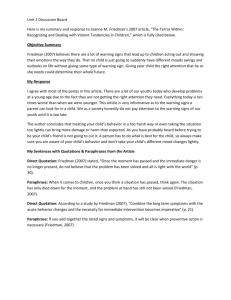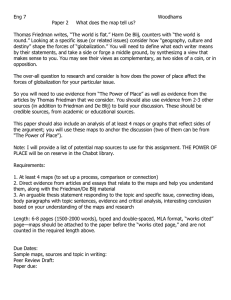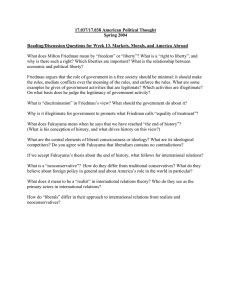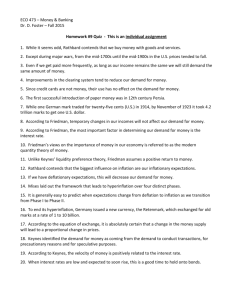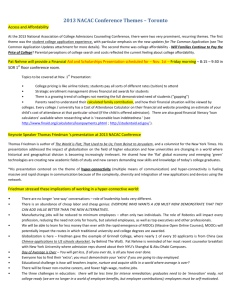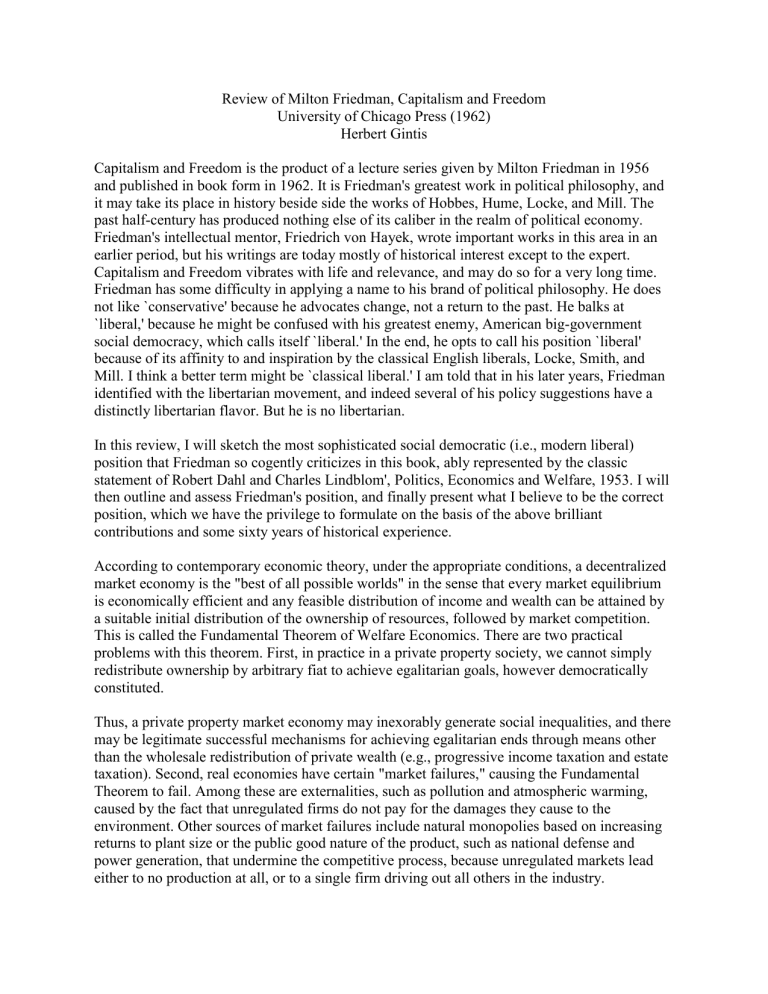
Review of Milton Friedman, Capitalism and Freedom University of Chicago Press (1962) Herbert Gintis Capitalism and Freedom is the product of a lecture series given by Milton Friedman in 1956 and published in book form in 1962. It is Friedman's greatest work in political philosophy, and it may take its place in history beside side the works of Hobbes, Hume, Locke, and Mill. The past half-century has produced nothing else of its caliber in the realm of political economy. Friedman's intellectual mentor, Friedrich von Hayek, wrote important works in this area in an earlier period, but his writings are today mostly of historical interest except to the expert. Capitalism and Freedom vibrates with life and relevance, and may do so for a very long time. Friedman has some difficulty in applying a name to his brand of political philosophy. He does not like `conservative' because he advocates change, not a return to the past. He balks at `liberal,' because he might be confused with his greatest enemy, American big-government social democracy, which calls itself `liberal.' In the end, he opts to call his position `liberal' because of its affinity to and inspiration by the classical English liberals, Locke, Smith, and Mill. I think a better term might be `classical liberal.' I am told that in his later years, Friedman identified with the libertarian movement, and indeed several of his policy suggestions have a distinctly libertarian flavor. But he is no libertarian. In this review, I will sketch the most sophisticated social democratic (i.e., modern liberal) position that Friedman so cogently criticizes in this book, ably represented by the classic statement of Robert Dahl and Charles Lindblom', Politics, Economics and Welfare, 1953. I will then outline and assess Friedman's position, and finally present what I believe to be the correct position, which we have the privilege to formulate on the basis of the above brilliant contributions and some sixty years of historical experience. According to contemporary economic theory, under the appropriate conditions, a decentralized market economy is the "best of all possible worlds" in the sense that every market equilibrium is economically efficient and any feasible distribution of income and wealth can be attained by a suitable initial distribution of the ownership of resources, followed by market competition. This is called the Fundamental Theorem of Welfare Economics. There are two practical problems with this theorem. First, in practice in a private property society, we cannot simply redistribute ownership by arbitrary fiat to achieve egalitarian goals, however democratically constituted. Thus, a private property market economy may inexorably generate social inequalities, and there may be legitimate successful mechanisms for achieving egalitarian ends through means other than the wholesale redistribution of private wealth (e.g., progressive income taxation and estate taxation). Second, real economies have certain "market failures," causing the Fundamental Theorem to fail. Among these are externalities, such as pollution and atmospheric warming, caused by the fact that unregulated firms do not pay for the damages they cause to the environment. Other sources of market failures include natural monopolies based on increasing returns to plant size or the public good nature of the product, such as national defense and power generation, that undermine the competitive process, because unregulated markets lead either to no production at all, or to a single firm driving out all others in the industry. The modern liberal position, supported by contemporary economic theory, is that the state should step in to correct these market failures, and thereby maximize social welfare. Because there are in fact many varied forms of market failure, the modern liberal political philosophy offers no protection against the emergence of a huge state sector with its power reaching deep into the system of private production, consumption, and exchange. Moreover, correcting market failures is much more difficult that it appears at first light, and there are often "state failures" prevent effective intervention. Thus, it is often is better to endure the market failures we have than to apply state interventions that aggravate rather the mitigate the market failures (e.g., state regulatory commissions are often captured by the industry itself and used to private advantage). It is this possibility of pervasive state failure that motivates Milton Friedman's critique and alternative. Friedman's major thesis is that there is an "inescapable connection between capitalism and democracy" in the sense that not only do the two forms of decentralized popular control have an elective affinity as forms of democratic empowerment, but also unconstrained governmental power to supplant the market undermines political democracy and ultimately leads to dictatorship. Capitalism, then, is a prerequisite for freedom. Friedman's minor thesis is that the role of government in a free society is properly limited to maintaining law and order, preventing coercion of one individual by another, enforcing private property and contracts, and providing for the common defense and a common monetary system. Friedman is not an unwavering ideologue on these points, and freely admits that when a society has social goals that cannot reasonably be satisfied through decentralized market activity but can be accomplished through government intervention, then it is legitimate to attempt a solution through political channels. He counsels, however, that when the unintended consequences of market interference are taken into account, there will be few cases in which such intervention will be indicated. Moreover, when it is indicated, the most effective intervention is likely to be one that maximally depends upon the market and decentralized decision-making for its implementation. Friedman gives several arguments in favor of his major thesis. The first is that economic freedom, the ability of consumers to buy and sell whatever they think best meets their needs and furthers their goals, is a "component of freedom properly understood," (p. 8) and hence its abrogation is a curb on freedom. For instance, if the government imposes a quota on a good that I would like to purchase but cannot because its price has become prohibitive, my personal freedom is curtailed. Similarly, if the government forces people to use the government-provided postal service, then my freedom to set up a competitive business in competition with the government service is curtailed. This argument has been criticized on the grounds that an interventionist government that increases the purchasing power of the less-well-off increases the economic freedom of the overwhelming majority of citizens, so the only individuals hurt by such an intervention are the relatively well-off, who are least damaged by restrictions on their economic freedom. This is a be a manifestly reasonable counter-argument, so Friedman's position is plausible only if government interventions are unlikely to improve the purchasing power of the less well-off, which is a clearly empirical matter. While there is some dispute over the matter, it appears that, at least for some period of time after WWII, European social democracies effectively redistributed income away from the rich. Thus Friedman's "economic freedom" argument is tenuous. Nevertheless, some state interventions, such as prohibiting private mail delivery services, do fall clearly under Friedman's critique of illegitimate state interference. Friedman's second argument is that the ability of government to intervene at will in the market economy directly threatens political democracy by limiting the ability of citizens to assess government behavior and to dissent from the practices of the current regime. For instance, if the government controls who can and cannot be hired, this power can be used to impose penalties on its political enemies. For instance, the US government after WWII forced the movie industry to blackball writers and actors who were considered political enemies, thus curtailing the political freedom of American Communists and their "sympathizers." This may seem reasonable given the threat Communism posed to liberal democracy (I actually do not agree with this position), but the same methods were used to criticize and smear opponents to the Vietnam War and many other legitimate political groupings. A sufficiently powerful government can also refuse to allow citizens access to the communications media by closing down oppositional newspapers, radio, and TV stations, thus effectively threatening those who disseminate information to conform to the current regime's preferences. Friedman also argues that a strong market economy creates a powerful basis for the decentralization of power, as the wealthy on the one hand, and masses of citizens on the other, have the means in a market economy to mount an effective opposition to arbitrary state power. I believe Friedman's argument here is very strong. Some would argue that the tendency for state economic power to undermine political democracy can be adequately curbed by an effective system of civil liberties and a secure separation of powers between executive, judicial, and legislative branches of government. This is a speculative argument with little in the form of supporting empirical evidence. I would argue that the threat that the government monopoly of economic power has to erode civil liberties and the separation of powers is too great to entertain any economic-political system that includes massive undermining of the private market economy. Friedman has rendered plausible that the diversification of economic power away from the state is an integral element of political and civil freedom. This is Friedman's most important contribution to political theory, and it rivals the pronouncements of the great political philosophers of the past. Of course, one can find echoes of Friedman's position in the classical literature (e.g., Locke's critique of Hobbes' defense of monarchy), but I have found nothing as persuasive as Friedman's argument. Of course, capitalism is not the only economic system that places economic power outside the all-powerful state. A system of worker controlled firms, each the owner of its own capital stock, is an obvious alternative, as is a system in which local communities own the capital stock and control local industries is another. However, after having spent several years attempting to implement such alternatives, I have come to the conclusion that these are not viable alternatives to capitalism (Samuel Bowles and Herbert Gintis, Recasting Egalitarianism: New Rules for Communities, States, and Markets, 1999). It is worth continuing to explore alternative effective mechanisms for the separation of economic and political power. However, until such an alternative is found, capitalism, accompanied by strong constitutional limitations on the government to intervene in the economy, and accompanied by a separation of powers and a healthy federalism that confers upon local regions fundamental and inalienable powers, all qualities of the US system of government, is the most conducive to human freedom among the forms of government that we know. Friedman support his minor thesis by arguing that the consumer sovereignty promoted by the market economy allows all individuals to achieve their preferred outcomes at the same time, without the need for all to submit to the same allocations through political fiat. In other words, the market "permits unanimity without conformity." (p. 23) Friedman's argument, based on the efficacy of the market system rather than a notion of the "inalienable rights" of citizens to unrestricted voluntary exchange, is both flexible and defensible. It allows the government to intervene, for instance, when market failures render market allocations socially costly, and it allows the government to outlaw markets in, say, body parts, recreational drugs, sexually exploitative literature and videos, and the like. The most important fact about Friedman's minor thesis is that the general notion that the free enterprise system, as opposed to economies where the economy is basically run by the state (e.g., state socialism) has proven to be absolutely, incontrovertibly correct. For an extended empirical argument to this effect, see Andre Schleifer, "The Age of Milton Friedman," Journal of Economic Literature 47,1 (2009), pp. 123-135. The free-market era really began on a world scale in about 1980, coinciding with the election of Margaret Thatcher in England, Ronald Regan in the US, and the Deng Xiao Ping market reforms in China. World per capita economic growth, which had been very slow in the post-WWII period, began to rise at a 2% rate in 1985, continuing through to receont years. Moreover, this growth was confined to countries with free market ecconomies, which excluded most of Africa and the Middle East. Russian economic growth accelerated about a decade later, coincident with its era of market reform. Ireland's spectacular economic growth, for instance, can be completely attributed to its free-market reforms. However, Friedman is not content to criticize state socialism and traditional non-market economies. He uses his political philosophy, in particular his minor thesis, to make quite specific policy recommendations within a fundamentally market-oriented economy (pp. 35-36). The remainder of the book is an elaboration upon these recommendations. The most serious indictment of Friedman's political philosophy is that many, if not most, of these recommendation, have been systematically violated in the USA in recent decades, and the results have be overwhelmingly positive and supported by the vast majority of Americans. This indicates that Friedman's minor thesis is in need of serious recasting if we are to accept it at all. The first four of Friedman's fourteen explicit recommendations are largely valid and supported by our experience in the past sixty years. These express opposition to (a) price supports; (b) quotas in international trade; (c) government control of output; and (d) rent control. Similarly, his thirteenth proposal, which would allow competition in the delivery of the mail, seems eminently reasonable, as does the eleventh, which advises against conscription into the military in peacetime. However, the remaining eight recommendations are prohibitions on measures that in fact have proven to be strong contributors to the well-being of citizens, and enjoy widespread popularity. Some of Friedman's recommendations seem doctrinaire to the point of being frivolous. These include his opposition (point seven) to regulation of radio and television speech by the FCC, his critique of state licensing of professionals (point 9), and of state control of National Parks (point 12) and toll roads (point 14). Of course, these state practices can be misused and overused, but they surely have a legitimate place in the good society. Perhaps the most dramatic of Friedman's recommendation in the current environment, which in 2009 characterized by severe economic instability set off by a massive financial failure in the housing sector, is Friedman's sixth point: prohibition against the "detailed regulation of banking." There has been a large general increase in the amount of financial regulation since Friedman wrote in the 1950's, and most students of the subject believe that this body of regulation has contributed critically to the stability and efficiency of the financial sector. Virtually all experts today, fairly independent of location in the political spectrum, hold that to avoid a reoccurrence of our current crisis, there must be increased financial regulation, and many believe the current financial failure was caused by loosening of financial regulation in the preceding period., Of course, another part of Friedman's sixth point is the inadvisability of detailed regulation of industry, especially by the Interstate Commerce Commission. Here Friedman appears to be correct: the loosening of Federal restriction on trucking, aviation, and communication has been salutary. Friedman's eighth point is that the social security system should be eliminated. This has not happened either in the USA or in any other industrial democracy. Social security programs, in which individuals are obligated to save for their retirement years, are popular among electorates, and modern behavioral game theoretic empirical results explain clearly that excessively short time horizons (excessive in the sense that individuals later would prefer to have saved more earlier) lead most individuals to undersave for the future, thus justifying public social security systems (justify in the sense that individuals will vote to have this system, even though it restricts their own personal saving decisions). Another of Friedman's proposal in the same vein is number ten which says that the government should not promote home ownership. Most students of the subject believe that the high frequency of home ownership achieved through mortgage availability and preferential tax provisions have contributed positively to the health of communities and a high level of local community political and social activity. Home ownership is a positive externality for local communities because individuals are more active in community affairs when they are home owners, if only because the value of their property is strongly affected by the quality of community life. Surprisingly missing from Friedman's list is the prohibition of laws creating artificial monopolies in general. I assume this is an oversight, because Friedman devotes the whole of Chapter 8 to this issue. I believe the classical liberal opposition to collusion in the restraint of trade is one of its most powerful principles. Concerning business, it was Adam Smith who said "People of the same trade seldom meet together, even for merriment and diversion, but the conversation ends in a conspiracy against the public, or in some contrivance to raise prices..." Friedman's position on labor unions (pp. 121ff) is that they are a similarly undesirable monopoly, but they have limited power in a competitive economy. It is clear, then, that Friedman's minor premise is wrong. It is not systematically wrong, but rather, somewhat like the proverbial broken clock that is correct exactly two times a day, it is randomly right and randomly wrong. What, then, is the proper framework for assessing the proper role of government in liberal capitalist society? I believe that the following issues are central. First, the comparative advantage of the state is its monopoly of the means of law-making and coercion, so the state should fix and regulate the rules of the game according to which the private economy operates. This implies that the government should not enjoy a monopoly in the production of anything that could not be produced through the competitive market process. This means, for instance, that the government can legitimately provide universal health insurance, but it cannot monopolize the delivery of health care. Similarly, the government can guaranteed the funding of the educational system, but it should not run schools unless these schools are forced to compete on an equal footing with privately run, for-profit or non-profit schools. This implies that voucher school systems should be the rule. Second, the state should not interfere in the competitive market system unless there are clear and recognized market failures, of the sort that are fully analyzed in standard economic theory. In particular, the state should not create natural monopolies that favor particular groups at the cost of the general public. This means, for instance, that laws favoring labor unions' ability to collude in the restraint of trade should not be countenanced. This does not imply the abolition of labor unions, but rather prohibits them from colluding across individual firms. The general protection of the rights of workers can be adequately addressed through general laws, including minimum wage and occupational safety and health laws, that apply across the board to all workers. Most important, public sector unions with bargaining rights should be prohibited. Third, when there are market failures, such as externalities, creating problems of urban zoning, environmental pollution, and the like, and natural monopolies, such as national defense and power generation, there is a prima facie case for active government intervention. However, what has been called "state failure," meaning the tendency for the state to act on behalf of special interest groups rather than the public as a whole, can render such interventions undesirable in many cases. Finally, the state has the right and the duty to intervene in the private economy to protect and enhance the rights of those who are incapable of protecting themselves. This includes the young, the elderly, and individuals with physical or mental incapacities, although only when laws enhancing the power of private charitable interventions prove insufficient. In particular, the state should have great power to eliminate poverty, which I define roughly as a situation in which a fraction of the population are born into situations in which they lack the means for full self-development and healthy participation in social life. I suspect that I am missing some central principles for a defensible alternative to Friedman's irreparably flawed minor premise, and I invite other readers to offer additions and corrections.
